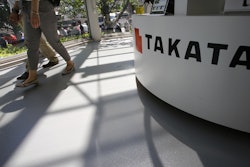UNITED NATIONS (AP) — Russia pledged to veto a Western-backed U.N. resolution Tuesday that would impose sanctions on 21 Syrian individuals, organizations and companies allegedly involved in chemical weapons attacks in the war-ravaged country.
The draft Security Council resolution would also ban all countries from supplying Syria's government with helicopters, which investigators have determined were used in chemical attacks.
The resolution, initially sponsored by Britain and France, was recently joined by the new United States administration of President Donald Trump.
France's U.N. ambassador, Francois Delattre, said Monday that his government was "very pleased that the new American administration has confirmed it shares completely our view" on the need for sanctions. British Ambassador Matthew Rycroft said U.S. support was a sign that the three countries are determined to oppose the proliferation of weapons of mass destruction and "make sure that chemical weapons cannot be used with impunity."
The resolution follows a joint investigation by the United Nations and the international chemical weapons watchdog that determined the Syrian government was behind at least three attacks involving chlorine gas and the Islamic State group was responsible for at least one involving mustard gas.
Russia, Syria's closest ally, joined the Western nations in establishing the joint investigation, known as the JIM, to determine responsibility for chemical attack.
But Russia's deputy U.N. ambassador, Vladimir Safronkov, said Friday that Moscow would veto the resolution, which he described as "one-sided," ''based on insufficient evidence" and "a provocation."
In a sharp retort, U.S. Ambassador Nikki Haley asked: "How much longer is Russia going to continue to babysit and make excuses for the Syrian regime? ... People have died by being suffocated to death. That's barbaric."
The Syrian government denies using chemical weapons in the civil war, now in its sixth year, but the three Western countries contend there must be accountability following the results of the JIM investigations.
"We call on all our colleagues in the council, all 15, to ... give a strong, clear, message tomorrow that the international community means business on preventing the use of these abhorrent weapons," Rycroft said.
But the British ambassador said he didn't see any indication that Russia would change its mind and allow adoption of the resolution.
The 11 Syrians who would be subject to an asset freeze and travel ban include Amr Armanzi, director-general of Syria's Scientific Studies Research Center, which is responsible for the development and production of chemical weapons and the missiles to deliver them. Nine current and former military officers and the managing director of a Ministry of Defense subsidiary that assists in the production of chemical weapons are also named.
The 10 "entities" that would be put on the sanctions blacklist and subject to an asset freeze under the draft resolution include the Scientific Studies Research Center and several Syrian government subsidiaries, proxies, front companies and factories allegedly involved in producing chemical weapons.
A chemical weapon attack on a Damascus suburb that killed hundreds of civilians on Aug. 21, 2013, led to a U.S.-Russian agreement and a Security Council resolution the following month that ordered the destruction of Syria's chemical weapons, precursors and the equipment to produce the deadly agents.
While insisting it did not stage the attack, the Syrian government supported the resolution and joined the chemical weapons watchdog known as the Organization for the Prohibition of Chemical Weapons, warding off possible U.S. military strikes.
Syria's declared stockpile of 1,300 metric tons of chemicals has been destroyed, but the OPCW is still investigating outstanding questions about possible undeclared chemical weapons.
The draft resolution expresses "grave concern" that the OPCW "is not able to resolve all identified gaps, inconsistencies and discrepancies in Syria's declaration" and calls on Syria to undertake an "expeditious resolution of all outstanding issues." This was watered down from the original draft, which would have ordered Syria to give a full declaration within 30 days of the resolution's adoption.
The proposed resolution also condemns "in the strongest terms any use of toxic chemicals as a weapon" by Syria's government or Islamic State extremists and demands an immediate halt. The militant group is already subject to U.N. sanctions and the resolution urges all countries "to redouble their efforts" to implement the measures.






















